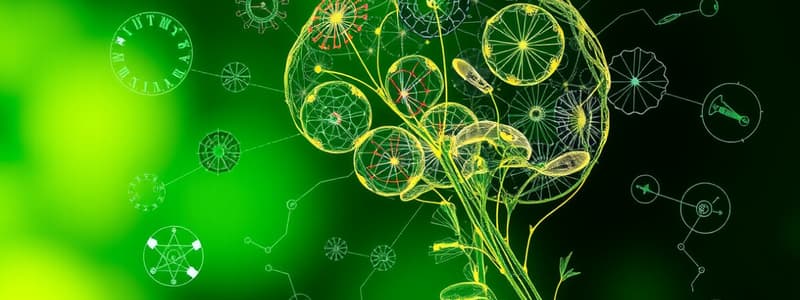Podcast
Questions and Answers
What is science?
What is science?
Science is an intellectual activity that involves observation, description, experimentation, and explanation of natural phenomena.
How does science help us understand the world?
How does science help us understand the world?
Science is a pathway by which we can come to discover and better understand our world.
What is biology?
What is biology?
Biology is the study of living things.
What are the key elements of scientific thinking?
What are the key elements of scientific thinking?
What question underlies scientific thinking?
What question underlies scientific thinking?
What is scientific literacy?
What is scientific literacy?
Why is scientific literacy important?
Why is scientific literacy important?
What is the first step of the scientific method?
What is the first step of the scientific method?
What is a hypothesis?
What is a hypothesis?
What is a theory?
What is a theory?
What are the key components of an experiment?
What are the key components of an experiment?
Why is controlling variables important?
Why is controlling variables important?
What is the placebo effect?
What is the placebo effect?
What is pseudoscience?
What is pseudoscience?
What is an element?
What is an element?
What is an atom?
What is an atom?
What is the nucleus of an atom composed of?
What is the nucleus of an atom composed of?
Study Notes
Introduction to Science and Biology
- Science encompasses observation, experimentation, and explanation of natural phenomena, rather than merely memorizing facts.
- It is a systematic approach to understanding and discovering the world.
- Biology is defined as the study of living organisms.
The Nature of Scientific Thinking
- Scientific thinking is empirical, relying on observable, testable, and repeatable evidence.
- It is self-correcting, allowing adjustments in understanding based on new evidence.
- The essential question of scientific thinking is: "How do you know that is true?"
Scientific Literacy
- Scientific literacy involves the ability to think critically and use scientific knowledge for informed decision-making.
- It is increasingly important for personal and societal decision-making, particularly in biological contexts.
The Scientific Method
- Initial observations drive scientific inquiry; for instance, noticing that echinacea extract may lower cold occurrence.
- A hypothesis serves as a tentative explanation and generates testable predictions.
- Testable predictions often follow an "If...then..." format to anticipate outcomes based on the hypothesis.
- Critical experiments allow for decisive comparisons between hypotheses, as seen in studies of eye-witness reliability.
- Drawing conclusions from experiments often leads to revisions of hypotheses based on gathered evidence.
Hypotheses and Theories
- A hypothesis is a proposed explanation that can lead to testable predictions about a phenomenon.
- A theory is a well-substantiated explanation, consistently supported by empirical data and extensive testing.
Elements of a Well-Designed Experiment
- Key experiment components include:
- Treatment: Conditions applied to subjects.
- Experimental Group: Receives the treatment being tested.
- Control Group: Treated identically to the experimental group but does not receive the treatment.
- Variables: Factors that can change; categorized as independent or dependent.
- Controlling variables is crucial to isolate the treatment's effects on outcomes.
The Placebo Effect and Experiment Design
- The placebo effect occurs when individuals respond positively to a treatment with no active therapeutic effect, underscoring the importance of control groups.
- The Clever Hans effect demonstrates how subtle cues can bias experimental results, highlighting the need for blind or double-blind study designs.
Avoiding Pseudoscience
- Pseudoscience refers to claims made that sound scientific but lack empirical support from reliable scientific studies.
- Anecdotal observations stem from limited experiences and can lead to false conclusions about relationships between variables.
Basics of Atoms and Elements
- An element is an indivisible substance that cannot be chemically broken down into simpler substances and is composed of atoms.
- An atom is the smallest unit of matter that retains the properties of the element.
Atomic Structure
- The nucleus of an atom contains positively charged protons and neutrally charged neutrons, forming the core of the atom.
Studying That Suits You
Use AI to generate personalized quizzes and flashcards to suit your learning preferences.
Description
This quiz covers the basic concepts of science and biology as foundational elements. It explores what science is, how it enriches our understanding of the world, and introduces essential biological themes. Ideal for students beginning their journey in scientific studies.




